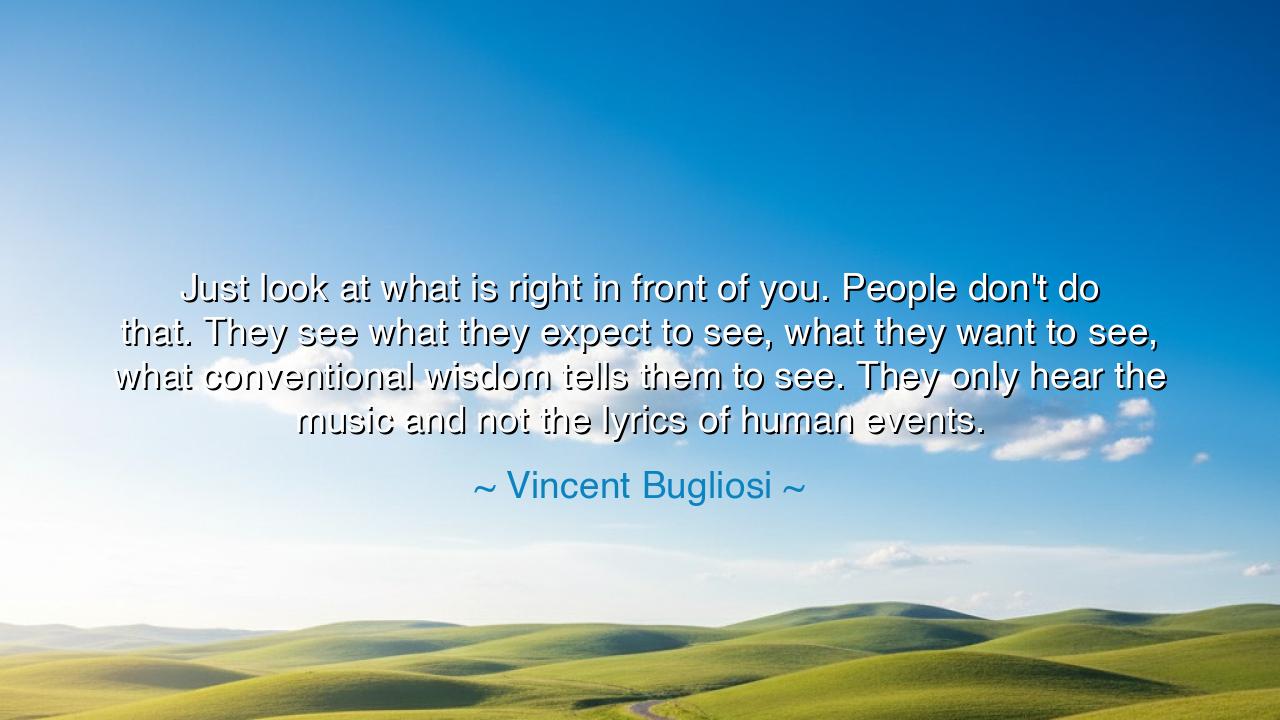
Just look at what is right in front of you. People don't do
Just look at what is right in front of you. People don't do that. They see what they expect to see, what they want to see, what conventional wisdom tells them to see. They only hear the music and not the lyrics of human events.






Hearken, O children of the ages, to the piercing words of Vincent Bugliosi, who bids us to awaken from the slumber of expectation and see with unclouded eyes. He teaches that too often men gaze upon the world not as it is, but through the veil of expectation, desire, or the dictates of conventional wisdom. To perceive only what one wishes to see is to miss the essence of truth, for the heart and mind are blinded when they substitute illusion for reality.
Bugliosi warns that in human affairs, many attend to the surface, hearing only the music of events without discerning the lyrics—the details, the motives, the truths hidden within. Wisdom demands that one observe attentively, that one look closely at what lies right in front of them, and not rely upon assumptions or preconceptions. Only then does clarity emerge, and the hidden currents of human action become intelligible.
Consider the work of Sherlock Holmes, though a figure of story, yet a mirror of reality’s lesson: he taught that observation without prejudice reveals truth where the untrained mind sees only chaos. In historical matters, detectives, historians, and chroniclers have learned that attention to detail, to the literal facts before one, uncovers secrets overlooked by those who rely upon expectation or rumor. Their victories arise not from imagination alone, but from disciplined seeing and listening.
Even in the affairs of nations, this principle endures. Leaders who heed only the conventional wisdom of their councils or advisors may be blindsided by events that lie plainly before them. The collapse of empires, the rise of revolutions, and the subtle shifts of diplomacy are often misread by those who hear only the superficial harmonies and ignore the hidden lyrics of circumstance. To act wisely is to attend to truth, unadorned and immediate, rather than the comfort of expectation.
O children of the future, carry this teaching in your hearts: do not let your vision be clouded by what you expect or desire. Look steadfastly at what is right in front of you, listen for the lyrics within the music of events, and question the narratives that would substitute ease for truth. In this vigilant attention lies the power to understand, to act wisely, and to discern reality amidst the illusions of the mind.
If you desire, I can also craft a visual, ancient scroll-style presentation of this passage to capture the heroic, timeless, and deeply evocative essence of Bugliosi’s teaching on perception, truth, and the vigilance of the mind.






D809. Do Canh Dat 8H
I wonder if there’s a way to break free from the tendency to interpret the world in a way that fits our narrative. The quote seems to imply that people miss the true essence of things by clinging to preconceived ideas, but isn’t it natural for us to do so? After all, aren’t those biases a survival mechanism? How do we create a balance between being open-minded and still relying on the frameworks that help us make sense of the world?
T7Ta Cong Thien 7C
The quote makes me wonder if we're truly capable of seeing things as they are, without our biases getting in the way. Can we ever fully separate ourselves from what we expect to see or want to believe? Or is that just an impossible ideal? I feel like, even when I try to be more mindful, there’s always a part of me that reacts based on past experiences. It's a challenging thought—what does true objectivity even look like?
NHNhu Hieu
I’ve been thinking a lot about the idea that people only 'hear the music and not the lyrics.' In this era of fast-paced media and social influence, it seems like we’re constantly distracted by surface-level details. Is it possible for us to truly listen and absorb the deeper meaning behind events and situations? Or is it too late to start unlearning the automatic responses we've developed over the years? I’d love to hear others' thoughts on this.
MTDP Sat my thuat
This reminds me of how we often misunderstand or miss the point in conversations or events because we’re so focused on what we think we already know. But isn't it a bit paradoxical? On one hand, conventional wisdom often guides us to make quick judgments, but on the other, that can also blind us from understanding the full story. Could society function more effectively if we all took a step back and just observed without judgment?
HDnguyen hoang duy
I find this quote quite intriguing because it touches on human nature—how we tend to filter reality through our own perspectives. Could it be that our biases are actually helpful in navigating life, making sense of the chaos around us? But then again, I think about how many times I've missed something important simply because I wasn't open-minded enough to see beyond my expectations. How do we learn to be more present and aware without getting stuck in our own mental patterns?